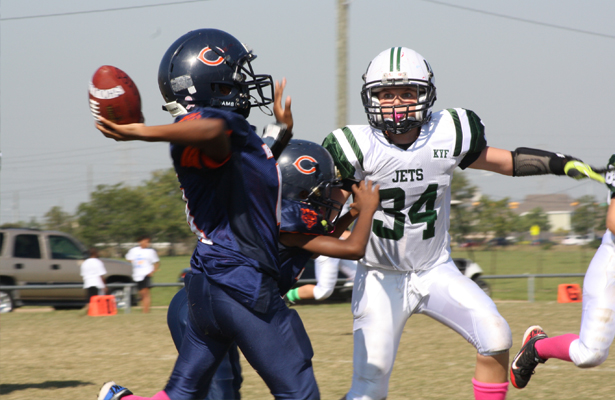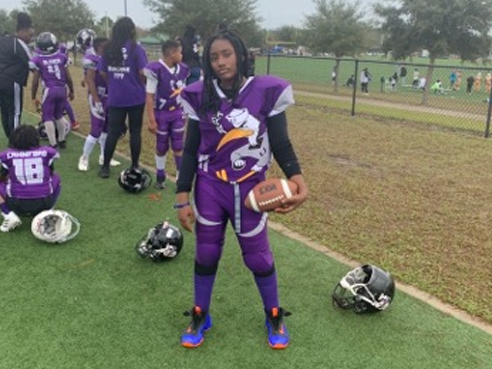Find youth tackle football leagues near you by searching online or checking local community centers. Contact local sports organizations for more information.
Youth tackle football leagues offer a great way for children to develop physical fitness, teamwork, and discipline. Many communities have well-organized local leagues catering to various age groups. These leagues often provide structured training sessions, matches, and tournaments.
Parents can get detailed information, including registration dates and fees, by visiting local sports centers or league websites. Coaches and volunteers usually ensure a safe and positive environment for young athletes. Participating in a tackle football league can be an exciting and rewarding experience for kids, promoting both athletic skills and personal growth.
Finding Local Leagues
Finding the right youth tackle football league near you is crucial for your child’s athletic development. Youth tackle football leagues provide an excellent opportunity for kids to learn teamwork, discipline, and sportsmanship. Parents often wonder where to start their search. This guide will highlight effective methods to discover local leagues.
Online Resources
In the digital age, online resources are indispensable for finding youth tackle football leagues. Various websites and platforms offer comprehensive information about local leagues.
Here are some key online resources:
- Google Search: Start with a simple search query like “youth tackle football leagues near me.” This will display a list of local leagues, their websites, and contact information.
- League Finder Websites: Websites like USA Football and Pop Warner provide tools to locate leagues based on your zip code.
- Social Media: Platforms like Facebook and Twitter often have local community groups where parents discuss and recommend various leagues. Join these groups and ask for suggestions.
- Local News Websites: Check local news websites for announcements about upcoming league registrations and events.
Here’s a table summarizing these resources:
| Resource | Description |
|---|---|
| Google Search | Search for leagues using specific keywords. |
| League Finder Websites | Websites like USA Football and Pop Warner help locate leagues. |
| Social Media | Community groups on Facebook and Twitter offer recommendations. |
| Local News Websites | Announcements and events related to youth football leagues. |
Community Boards
Another effective method is checking community boards. These boards are usually found in places frequented by families and community members.
Consider these locations:
- Schools: Many schools have bulletin boards with flyers about local sports leagues. Check with the school administration for more details.
- Community Centers: Community centers often host various youth activities. Visit these centers and look for bulletin boards filled with information about local leagues.
- Local Libraries: Libraries are hubs of community information. They typically have bulletin boards and pamphlets about various local activities, including sports leagues.
- Grocery Stores: Some grocery stores have community boards near the entrance or exit. These boards can have flyers for local events and leagues.
Here’s a table summarizing community board locations:
| Location | Details |
|---|---|
| Schools | Bulletin boards with flyers about sports leagues. |
| Community Centers | Host various youth activities and have bulletin boards. |
| Local Libraries | Information hubs with bulletin boards and pamphlets. |
| Grocery Stores | Community boards near the entrance or exit. |

Credit: www.ucyfl.com
Age Groups And Teams
Are you searching for youth tackle football leagues near you? Knowing the age groups and teams can help you make the right choice for your child. Youth tackle football leagues often have specific age categories and team structures to ensure a safe and enjoyable experience for all players.
Youth Categories
Youth tackle football leagues typically divide players into different age categories. This ensures that kids play with others of similar physical and emotional development. Here are some common age categories:
- 6-8 Years Old: This age group is often called “Pee-Wee” or “Tiny Mites.” The focus is on learning basic football skills and having fun.
- 9-10 Years Old: Known as “Junior Pee-Wee” or “Mighty Mites,” these teams start to introduce more advanced techniques.
- 11-12 Years Old: Called “Pee-Wee” or “Junior Varsity,” players in this group work on team strategies and improve their skills.
- 13-14 Years Old: Often referred to as “Varsity” or “Senior,” these teams prepare players for high school football.
Each age category focuses on different aspects of the game. Younger groups emphasize fun and basic skills. Older groups focus more on advanced techniques and team play. Here’s a quick reference table:
| Age Group | Common Name | Focus |
|---|---|---|
| 6-8 Years Old | Pee-Wee/Tiny Mites | Basic Skills, Fun |
| 9-10 Years Old | Junior Pee-Wee/Mighty Mites | Advanced Techniques |
| 11-12 Years Old | Pee-Wee/Junior Varsity | Team Strategies |
| 13-14 Years Old | Varsity/Senior | High School Preparation |
Team Structures
Understanding team structures is crucial for parents and young players. Teams are usually organized in a way that balances competition and development. Here are some typical structures:
- Offensive and Defensive Units: Teams often have separate units for offense and defense. This allows players to specialize and excel in specific roles.
- Special Teams: Special teams focus on specific game situations like kickoffs and punts. Players in these roles need unique skills.
- Coaching Staff: Each team has a head coach and several assistant coaches. They provide guidance and ensure that each child gets attention.
- Practice Squads: Some leagues have practice squads. These squads help new players get more practice before joining the main team.
The team structure ensures that every player gets the chance to learn and grow. Here’s a table to summarize the typical team roles:
| Role | Description |
|---|---|
| Offensive Unit | Focuses on scoring points |
| Defensive Unit | Prevents the other team from scoring |
| Special Teams | Handles kickoffs, punts, and field goals |
| Coaching Staff | Guides and trains the players |
| Practice Squads | Provides extra practice for new players |
Understanding these structures can help parents and players know what to expect. It also ensures a smoother experience in youth tackle football leagues.
Registration Process
Finding the right Youth Tackle Football League near you can be exciting. The registration process is crucial. It ensures your child is ready to hit the field. Knowing the steps helps make the process smooth and stress-free.
Important Dates
Marking important dates on your calendar is essential. Registration typically opens a few months before the season starts. Missing these dates can mean your child won’t be able to play. Here are some key periods to remember:
- Early Registration: Many leagues offer early registration discounts. This period usually starts in January and runs through February.
- Regular Registration: Regular registration begins in March and ends in late April. Make sure to register during this period to avoid late fees.
- Late Registration: If you miss the regular period, late registration is available in May. Note that spots might be limited, and additional fees may apply.
- Tryouts and Practices: Tryouts usually occur in June. Practices generally start in July, so ensure your schedule is free.
Creating a table can help you keep track of these dates:
| Event | Date |
|---|---|
| Early Registration | January – February |
| Regular Registration | March – April |
| Late Registration | May |
| Tryouts | June |
| Practices Start | July |
Required Documents
Having the correct documents ready is vital. Most leagues need specific paperwork for registration. Missing documents can delay your child’s participation. Here are the common documents required:
- Birth Certificate: This proves your child’s age. A photocopy is often acceptable.
- Proof of Residency: An electric bill or lease agreement works. This confirms you live in the league’s area.
- Medical Clearance: A doctor’s note stating your child is fit to play. It ensures your child can safely participate.
- Parental Consent Form: This gives permission for your child to play. It often includes a waiver of liability.
- Photo ID: A recent photo of your child. This helps coaches and officials recognize players.
Prepare these documents in advance to avoid last-minute rushes. Make copies and keep them organized in a folder. This will help make the registration process smooth and efficient.
Coaching Standards
Youth Tackle Football Leagues near Me offer an excellent opportunity for young athletes to develop their skills, teamwork, and love for the game. A crucial aspect of these leagues is the Coaching Standards that ensure a safe, supportive, and effective learning environment for the players. Let’s delve into the essential aspects of these standards.
Certification Requirements
Coaches in youth tackle football leagues must meet specific certification requirements to ensure they are qualified to guide young athletes. These requirements often include:
- Background Checks: Ensuring the safety of the children, all coaches undergo thorough background checks.
- First Aid and CPR Certification: Coaches must be trained in first aid and CPR to handle any emergencies on the field.
- Concussion Training: Understanding the signs of concussions and proper response protocols is crucial for youth coaches.
- Coaching Clinics: Attending coaching clinics that focus on the fundamentals of football and effective coaching techniques.
Here is a table summarizing the certification requirements:
| Requirement | Description |
|---|---|
| Background Check | Ensures the safety of the players by vetting coaches’ histories. |
| First Aid and CPR | Equips coaches with the skills to handle medical emergencies. |
| Concussion Training | Educates coaches on recognizing and managing concussions. |
| Coaching Clinics | Provides coaches with knowledge of football fundamentals and techniques. |
Coaching Philosophy
The coaching philosophy in youth tackle football leagues is centered around the development of the whole athlete. This philosophy includes:
- Skill Development: Emphasizing the fundamentals of football, including passing, catching, and tackling.
- Teamwork: Instilling the importance of working together and supporting teammates.
- Character Building: Encouraging values like respect, discipline, and perseverance.
- Fun and Enjoyment: Ensuring that the game remains enjoyable for all participants, fostering a lifelong love for the sport.
Coaches often implement these philosophies through structured practices and positive reinforcement. They also focus on creating a positive and inclusive environment where every player feels valued and motivated to improve.
Here’s a brief overview of the core elements of the coaching philosophy:
| Element | Description |
|---|---|
| Skill Development | Focuses on improving fundamental football skills. |
| Teamwork | Encourages collaboration and support among players. |
| Character Building | Promotes values like respect and discipline. |
| Fun and Enjoyment | Ensures that playing football remains enjoyable. |
Youth tackle football leagues near you prioritize coaching standards to create a safe, educational, and enjoyable experience for young athletes. Whether it’s through rigorous certification requirements or a well-rounded coaching philosophy, these leagues aim to nurture both the physical and mental growth of their players.
Safety Protocols
Are you searching for youth tackle football leagues near you? Safety is a top priority in these leagues. Understanding safety protocols can help parents feel more confident about their children’s participation. Let’s explore some crucial safety measures implemented in youth tackle football leagues.
Concussion Policies
Concussions are serious injuries that can occur in contact sports like football. Youth tackle football leagues have stringent concussion policies to ensure player safety. These policies often include:
- Baseline Testing: Players undergo baseline cognitive tests before the season starts. This helps in comparing post-injury results if a concussion is suspected.
- Immediate Removal: Any player suspected of having a concussion is immediately removed from the game. This prevents further injury.
- Medical Evaluation: A certified healthcare professional must evaluate the player. This ensures accurate diagnosis and appropriate treatment.
- Gradual Return: Players follow a step-by-step protocol to return to play. This involves light exercise progressing to full contact, ensuring the player is fully recovered.
Here’s a quick look at a typical concussion protocol:
| Step | Activity | Duration |
|---|---|---|
| 1 | Rest | 24-48 hours |
| 2 | Light Aerobic Exercise | 15-20 minutes |
| 3 | Sport-specific Exercise | 30 minutes |
| 4 | Non-contact Drills | 60 minutes |
| 5 | Full-contact Practice | Full session |
| 6 | Return to Play | Full game |
Equipment Regulations
Proper equipment is essential for safety in youth tackle football. Leagues enforce strict equipment regulations to protect young athletes. These regulations include:
- Helmet Standards: Helmets must meet NOCSAE standards. Regular inspections ensure they are in good condition.
- Shoulder Pads: Shoulder pads must fit properly. They should provide adequate protection without restricting movement.
- Mouthguards: Players must wear mouthguards at all times during games and practices. This protects teeth and reduces the risk of concussion.
- Additional Gear: Many leagues require additional protective gear like knee pads, thigh pads, and hip pads.
Here’s a list of essential equipment and their safety standards:
| Equipment | Standard |
|---|---|
| Helmet | NOCSAE Certified |
| Shoulder Pads | Proper Fit |
| Mouthguard | Mandatory |
| Knee Pads | Required |
| Thigh Pads | Required |
| Hip Pads | Required |
Ensuring all equipment meets these standards helps minimize the risk of injury. Parents should regularly check gear for wear and tear.

Practice And Game Schedules
Youth Tackle Football Leagues near Me offer young athletes a chance to learn teamwork, discipline, and sportsmanship. Understanding the Practice and Game Schedules helps families plan their week effectively. This section provides an overview of what to expect in terms of practice times and game days.
Typical Weekly Schedule
The typical weekly schedule for youth tackle football is well-structured. This ensures kids get ample practice while balancing school and family time. Here’s a breakdown:
- Monday: Rest Day – No practice or games.
- Tuesday: Practice from 5:00 PM to 7:00 PM.
- Wednesday: Light Practice or Strategy Session from 5:00 PM to 6:30 PM.
- Thursday: Full Practice from 5:00 PM to 7:00 PM.
- Friday: Rest Day – No practice, preparing for the game.
- Saturday: Game Day – Times vary based on the schedule.
- Sunday: Optional Recovery Session or Team Meeting from 3:00 PM to 4:00 PM.
Practices are crucial for building skills and understanding plays. Coaches focus on fundamentals and team drills. The schedule allows for adequate rest to avoid burnout. Parents should ensure kids stay hydrated and well-rested.
Game Locations
Game locations vary but are usually within a 30-mile radius. This helps manage travel time and keep it convenient for families. Here are some common locations:
| Location | Address | Distance from Center |
|---|---|---|
| Central Park Field | 123 Main St, Anytown | 10 miles |
| Eastside Sports Complex | 456 East Ave, Anytown | 15 miles |
| West Valley Stadium | 789 West Rd, Anytown | 20 miles |
Parents should check the league website for the latest game schedules and locations. Arriving early is recommended for warm-ups and team meetings. Each location offers facilities like restrooms, snack bars, and parking areas.
Carpooling is a popular option to reduce travel stress and costs. Coordinating with other parents makes game days more enjoyable and less hectic.
Costs And Fees
Joining a youth tackle football league is an exciting step for many kids. It helps them build skills, make friends, and stay active. Parents often wonder about the costs and fees associated with these leagues. Understanding these expenses can help you budget and plan for a fun season.
Registration Fees
The registration fees for youth tackle football leagues can vary. These fees usually cover the basic costs of running the league. This includes field rentals, referees, and league administration. Here are some typical costs you might see:
- League Registration: $100 – $250
- Insurance Fees: $20 – $50
- Uniforms: $50 – $100
Some leagues offer discounts for early registration or multiple children. It’s a good idea to check if the league offers payment plans to spread out the cost. Look at this table for a quick breakdown of possible registration fees:
| Item | Cost Range |
|---|---|
| League Registration | $100 – $250 |
| Insurance Fees | $20 – $50 |
| Uniforms | $50 – $100 |
Additional Expenses
Beyond registration fees, there are additional expenses to consider. These can include equipment, travel, and snacks. Here are some common extra costs:
- Equipment: Helmets, pads, and cleats can add up. Expect to spend $150 – $300 on gear.
- Travel Costs: Away games may require fuel and possible lodging. Budget $20 – $100 per trip.
- Snacks and Drinks: Keeping your child hydrated and energized is key. Weekly costs might be $10 – $20.
Some leagues may provide rental equipment to reduce costs. Check if your league offers used gear sales or exchanges. Here is a table summarizing the additional expenses:
| Item | Cost Range |
|---|---|
| Equipment | $150 – $300 |
| Travel Costs | $20 – $100 per trip |
| Snacks and Drinks | $10 – $20 per week |
By planning ahead, you can ensure your child has a fantastic experience in their youth tackle football league.

Community Involvement
Many families seek youth tackle football leagues near them to provide their children with an exciting sports experience. These leagues offer more than just athletic activities; they foster a sense of community. Community involvement plays a crucial role in the success of these leagues, creating a supportive environment for young athletes to grow and thrive.
Parent Participation
Parents are the backbone of youth tackle football leagues. Their involvement is vital to the smooth operation and success of the league. Here are some ways parents can participate:
- Coaching: Many parents volunteer as coaches, sharing their knowledge and enthusiasm for the game.
- Team Managers: Parents can help manage team logistics, including organizing practices and handling communications.
- Fundraising: Parents often lead or support fundraising efforts to cover equipment costs and league fees.
Parent participation not only helps the league but also strengthens the bond between parents and their children. By being actively involved, parents can:
- Model good sportsmanship and teamwork.
- Spend quality time with their kids.
- Build a sense of community with other families.
Below is a table highlighting some of the key roles parents can take on:
| Role | Responsibilities |
|---|---|
| Coach | Lead practices, teach skills, motivate players. |
| Team Manager | Organize schedules, manage communications, handle logistics. |
| Fundraiser | Plan events, coordinate donations, manage funds. |
Volunteer Opportunities
Volunteers are essential to the success of youth tackle football leagues. They fill various roles that keep the league running smoothly. Here are some volunteer opportunities available:
- Game Day Helpers: Assist with setting up the field, managing equipment, and ensuring everything runs smoothly.
- Concession Stand Workers: Help raise funds for the league by running the concession stands during games.
- Event Coordinators: Plan and execute special events like award ceremonies and end-of-season parties.
Volunteering provides a great way for community members to get involved. By volunteering, individuals can:
- Support local youth and sports programs.
- Build relationships with other community members.
- Gain a sense of accomplishment and pride.
Here is a table outlining some volunteer roles and their duties:
| Volunteer Role | Responsibilities |
|---|---|
| Game Day Helper | Set up field, manage equipment, assist with logistics. |
| Concession Stand Worker | Sell food and drinks, handle money, restock supplies. |
| Event Coordinator | Plan events, manage schedules, coordinate volunteers. |
Conclusion
Discovering local youth tackle football leagues can provide numerous benefits for young athletes. These leagues promote physical fitness, teamwork, and discipline. Find a league nearby to help your child develop important skills and enjoy the excitement of the game. Start your search today and let the adventures begin!


